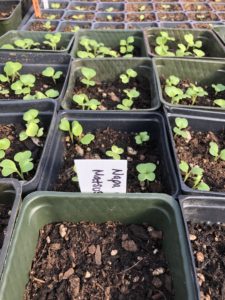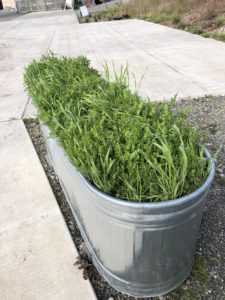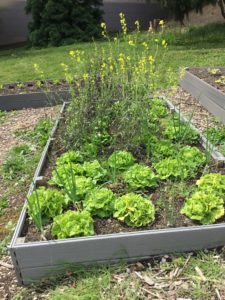
If you are like many of us, fortunate to be healthy and safe from the COVID-19 illness, you might be finding yourself home right now with some time on your hands. And if you are also like many of us northwesterners, in love with the outdoors, you might be coming to the realization that you actually have time to garden right now. This is a good thing. Gardening can keep us focused on the positive as much as we can be during this difficult time. For those who are affected or whose families have been touched by this tragedy we send you our love. We will garden for you and keep you in our thoughts.
Be Safe Out There!
The best news about gardening is that it can be a joyful experience that allows us time to do something normal, and natural, without worrying about contact with strangers or surfaces they have touched. We are all hyper aware of this right now and digging in the soil and being outside of your house allows you to relax and be in the moment without concerns. Especially with the warm spring sunshine on your face. Gardening solo or with your family is a great stress reliever and will reward you with the fruits of your labor later on this spring and summer. Gardening in your yard is encouraged and safe for you this spring!
Get out and get growing!
- Pull those early emerging weeds. Shotweed (one of the annual cresses we see in the garden all spring) is up and blooming already! Pull it out before it goes to seed and shoots its bountiful seed bank into your soil. Did you know this “weed” was edible? Trim the roots and wash the plant and add it to your springtime salad for a dose of vitamins and minerals – boost your immune system for a double bonus! Mulch over the areas you weeded to discourage more weeds, unless of course you love the taste. You will find many other annual weeds coming up now as well as the tougher perennials like dandelion and dock. All weeds have a useful nature. Call us to learn more about them!
- Trim out the dead materials you might have left for wildlife last fall. Dead flower heads on your hydrangeas, old marigold or cosmos stalks you left in place for the birds to forage seed from, old leaves on your overwintered kale or collards, all can use your attention right now. Be careful of hollow reeds and other spaces solitary native bees might be nesting still. Clip them up and leave them as mulch around your plants or send them off to the compost pile (homegrown or municipal) to transform into soil enriching products. Black ground beetles love mulched areas and will reward your efforts with some early slug control in your garden.
- Get your soil prepared in your vegetable garden. If your soil is not too wet it is time to start adding some compost and even getting some early things planted. To check if the soil can and should be handled right now take a clump of soil from your garden bed and roll it into a ball in your hand. Toss it into the air from your hand back into your hand a few times and see if it breaks apart. If it clings together and doesn’t fall apart at all it is not ready to dig in. Digging in wet soil will harm the structure of soil, making it hard and compact and causing it to not drain well later. Soil testing through the King Conservation District is suspended right now but later on you can take samples to get a thorough analysis if what your garden needs. For now, focus on drainage and soil structure. You can refer to our soil resource page for more information.
- Turn in your cover crops. If your soil is ready to be worked and you want to plant some early crops like peas and radishes it is time to turn the cover crop under the soil. You don’t need to belabor it, just turn it under with a garden fork and give it a week or so to die back. If you are anxious to get planting pull your cover crop from the area you want to plant and use it as mulch in other areas of the garden or turn it in with the rest of the garden bed. Cover crops add structure to the soil which improves drainage, they provide food and habitat for soil organisms that help feed your plants and add nitrogen to the soil to help your plants grow. Watch our latest YOUTUBE video about cover crops in the garden.

- Plant early crops! Pea season is upon us. Even if all you have is a patio or deck you can grow some peas. You just need a pot (with holes for drainage) deep enough to accommodate about 12 inches of roots, some good potting soil (from a bag), a way to support the vines or a place the vines can trail from and your choice of pea seeds to grow. The sunnier the site is the better but if you have at least four hours of sun you can find yourself munching on a lovely crop of fresh peas in about 2 months. For quicker returns plant some radishes right now! Your pot can be smaller and you will find fresh radishes in your salad in a month from now.
- Microgreens can grow indoors so if you don’t have any outdoor space try growing a crop of fast growing, nutrient packed microgreens. You can add them to your salad, use them as garnish for a dish or toss into a smoothie in the morning. Fill a shallow container with potting soil, leaving enough space to top off the pot with soil that’s not so high that it will spill over when watered. Containers you can try include plastic to go clamshells or the clear tubs that pre-mixed salads come in. Densely spread the seed on top of the soil using one type of seed. Though many plants grow well as microgreens they all have different germination rates so it works best to use one type of seed. Try some radish or mustard green seeds for a very fast crop with a spicy bite. Use sunflowers to get a taller and nutty tasting crunch. Try using older seed you have around to use it up. Harvest these delicious sprouts when they have developed their first set of true leaves – the first leaf set on a seedling is called a cotyledon and they look different than the true leaves. Wait until the next set, the true leaves unfurl then trim off the greens above the soil with scissors and use the whole thing. Stay tuned for an instructional video on microgreens from us!

If you are gardening in public spaces use your own gloves and tools if possible and if using communal tools be sure to clean them with alcohol or bleach and water to destroy any vestiges of germs. Local nurseries and garden stores are still currently open and prepared to offer you access to gardening products safely. Take the regular precautions when going to shop in public spaces to avoid close contact with others and minimize touching surfaces. Wash your hands and don’t touch your face. If going out shopping is not safe for you right now or if we are asked to not shop except for essential needs, mail order sources for seeds and some plants are available too.
Be sure to reach out if you need some support or advice on your garden.
We are here for you right now as always!
206-633-0224 or email us
Laura, Melissa, Selena and Jules